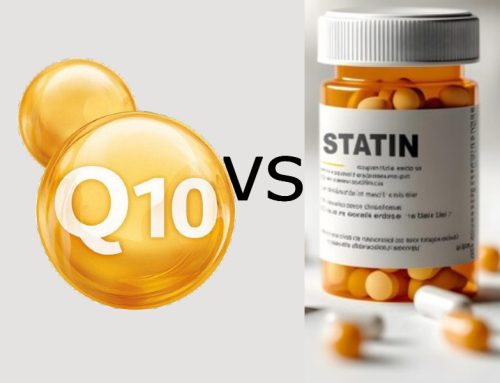In heart disease patients, adjuvant treatment with Coenzyme Q10 can add something positive to the conventional treatment. In particular, CoQ10 acts to boost mitochondrial ATP energy generation. Improved ATP energy generation promotes better contractility of the heart muscle tissue [Xu 2024].

Cardiologist Svend Aage Mortensen (1942-2015) was the lead researcher on the Q-Symbio study of CoQ10 adjuvant treatment of heart disease patients.
Thus, CoQ10 supplementation is something different from the use of conventional heart failure medications. Standard heart failure medications act by blocking unwanted activity in the heart. CoQ10 does not block anything. Instead, it promotes desirable activity: better heart muscle function [Xu 2024].
Note: Energy starvation of the heart muscle cells is an important cause of heart failure. CoQ10 supplementation addresses this aspect of heart failure [Mortensen 2014].
2024 Meta-Analysis of CoQ10 and Heart Failure Clinical Trials
A 2024 systematic review and meta-analysis of 33 studies of CoQ10 and heart failure has shown the following beneficial outcomes of supplementation [Xu 2024]:
- reduces all-cause mortality
- reduces hospitalization for heart failure
- reduces brain natriuretic peptide level
- improves the New York Heart Association functional classification
- improves left ventricular ejection fraction
- improves six-minute walk test result
- provides beneficial effects without any major adverse effects
Coenzyme Q10 Compared to Conventional Heart Failure Treatment
Standard treatment of heart failure relies on beta-blockers, ACE inhibitors, and AT1 antagonists.
- Beta-blockers block beta-adrenergic receptors. Blocking these receptors lowers the rate and force of heart contractions. Blocking the receptors lowers blood pressure.
- ACE inhibitors block the activity of the angiotensin-converting enzyme. Using ACE inhibitors causes vasodilation and lowers blood pressure.
- AT1 antagonists block the angiotensin II type 1 receptors. Blocking these receptors prevent vasoconstriction and help to lower blood pressure.
- Diuretics block the build-up of fluid in the lungs and in tissues. Fluid build-up is a common symptom in heart failure.

Dr. William Judy (1938-2022) was for 40 years a leading researcher studying the effects of CoQ10 supplementation on heart disease management. In 2018, Dr. Judy published the book entitled Coenzyme Q10: The Substance That Powers Life. Available from amazon.com. ISBN: 978-87-7776-186-7.
Coenzyme Q10, on the other hand, does not block any activity in the heart and circulation. Instead, it improves the heart’s bio-energetics [Mortensen 2014].
Note that the conventional heart failure drugs do alleviate symptoms. However, they have had only limited success in improving survival rates and in reducing hospital readmission rates. Something more is needed. That is rationale for using CoQ10 supplementation as an adjuvant to the conventional heart failure drugs [Xu 2024].
Coenzyme Q10 and Heart Failure in the Q-Symbio Study
In 2014, Prof. Svend Aage Mortensen et al published the results of the Q-Symbio study of the effect of adjuvant CoQ10 treatment on morbidity and mortality in chronic heart failure patients. In June 2025, this study had already been cited some 550 times in the medical journal literature.
The Q-Symbio study researchers enrolled 420 patients with chronic heart failure. They randomly assigned the heart failure patients to take 3 x 100 mg ubiquinone Coenzyme Q10 or matching placebos. Composite major adverse cardiovascular events occurred in only 15% of the patients in the CoQ10 group as contrasted with 26% in the placebo group [Mortensen 2014].
In addition, the following secondary endpoints were significantly lower in the CoQ10 group compared with the placebo group [Mortensen 2014]:
- cardiovascular mortality (9% vs. 16%)
- all-cause mortality (10% vs. 18%)
- incidence of hospital stays for heart failure reduced
- NYHA functional class improved after 2 years
In addition, the number of adverse events tended to be lower in the CoQ1o group compared to the placebo group (26 versus 41).
Conclusion: CoQ10 Adjuvant Treatment and Heart Failure
The results of the Q-Symbio Study have shown that long-term adjuvant CoQ10 treatment of patients with chronic heart failure is safe, improves symptoms and survival, and reduces the risk of major adverse cardiovascular events.
The results of the Xu meta-analysis have shown that adjuvant CoQ10 therapy in patients with heart failure reduces all-cause mortality and hospitalization for heart failure.
The CoQ10 adjuvant treatment also improves the patients’ NYHA functional classification, left ventricular ejection fraction, and six-minute walk time.
Remember: It is important to buy and take a CoQ10 supplement for which the manufacturer provides scientific documentation of its absorption and bioavailability and efficacy.
Sources
Mortensen SA et al. The effect of coenzyme Q10 on morbidity and mortality in chronic heart failure: results from Q-Symbio: a randomized double-blind trial. JACC Heart Fail. 2014 Dec;2(6):641-9.
Xu J et al. Efficacy and safety of coenzyme Q10 in heart failure: a meta-analysis of randomized controlled trials. BMC Cardiovasc Disord. 2024 Oct 26;24(1):592.
The information presented in this review article is not intended as medical advice. It should not be used as such.








Can I take CO q10 With my statin?
The cardiologists Raizner and Quinones (Department of Cardiology, Houston Methodist DeBakey Heart and Vascular Center, Houston, Texas, USA) say:
“Coenzyme Q10 is a naturally occurring compound that is found in animals and all humans. It has a fundamental role in cellular energy production. Although it is produced in the body, tissue deficiency can occur due to medications such as statins, which inhibit the mevalonate pathway. The clinical syndromes of statin-associated muscle symptoms (SAMS) and some of the features observed in patients with heart failure (HF) may be related to blood and tissue deficiency of CoQ10. Numerous clinical trials of CoQ10 in SAMS have yielded conflicting results. Yet, the weight of evidence as reflected in meta-analyses supports the use of exogenous CoQ10 in SAMS.”
Raizner AE, Quiñones MA. Coenzyme Q10 for Patients With Cardiovascular Disease: JACC Focus Seminar. J Am Coll Cardiol. 2021 Feb 9;77(5):609-619. doi: 10.1016/j.jacc.2020.12.009.
https://pubmed.ncbi.nlm.nih.gov/33538259/